Safely Eating Street Food Around the World
My first adventures in eating street food outside the United States took place when I was in college traveling in Greece. I was a pretty green traveler and happily ate souvlaki, salads and yogurt from street vendors on a student’s budget without incident. Naiveté and luck kept me safe.
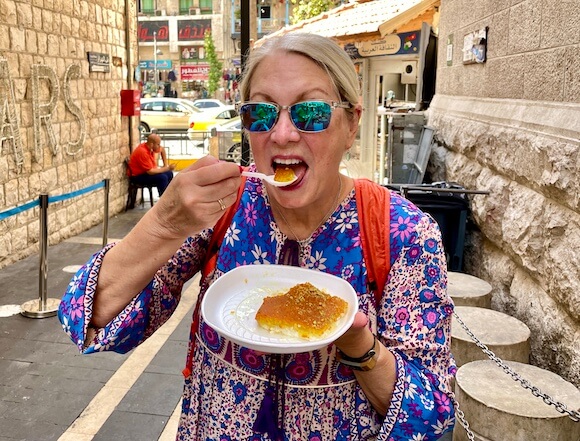
The only time I saw the inside of a doctor’s office was when my friend badly chipped her capped tooth, and after the treatment she got, I’m not convinced the man was even a real doc.
Can you believe there was a translated phrase in our guide book: “my artificial tooth needs replacing”? I can still hear the THWACK of the rubber band he used to get the cemented tooth off her gums! As you can imagine, it was not a pleasant experience, but I digress….
Editors Note: This post was originally published in September 2016 and has been completely updated for accuracy and comprehensiveness.
What is Street Food?
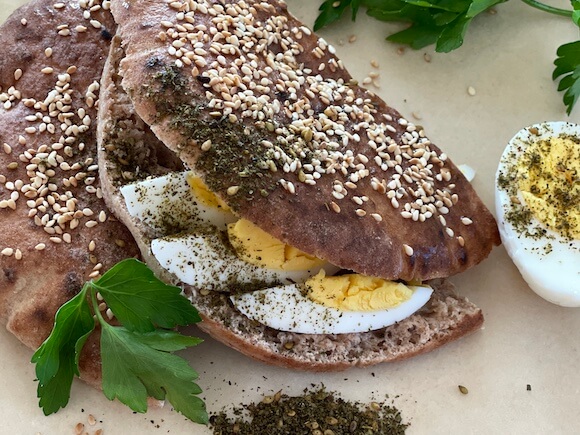
Arabic street food Ka’ak with egg and za’atar.
According to Wikipedia:
Street food refers to food or drinks sold by a hawker or vendor on a street or at other public places, such as markets, fairs, and parks. It is often sold from a portable food booth, food cart, or food truck and is meant for immediate consumption.
Research from the Food and Agriculture Organization indicates world wide over 2.5 billion people eat street food on a daily basis. Food vendors saw the intervention of government rules and regulations as early as the 14th century. While safely eating street food has become a global concern for public health, some studies indicate that the incidence of contamination is actually quite low, with a rate on a par with restaurants.
Certainly here in the United States we hear about cases in the restaurant scene far more often than from a street food vendor. The difficulty in tracking cases and reporting systems could be offering a skewed picture for what is actually taking place, and that’s why knowledge and safety are so important for the individual traveler.
Learn From Experience
Fast forward a few years and I found myself traveling regularly to the Philippines for the manufacturing business I co-owned. Strict instructions to boil it, peel it or forget it were part of my travel plans. Usually my time was short, my days were focused on my bottom line, and I couldn’t afford to get sick. I packed a lot of food, and my partner and I were incredibly cautious about what we ate. Food poisoning and getting sick were to be avoided at all costs.
That wariness didn’t stop a cockroach the size of a small child from appearing in the salad of a diner sitting next to me. Honestly, my caution didn’t stop me from getting sick on just about every trip I took. The change in water-even when you are drinking bottled, combined with all the other changes you are experiencing in time and food does a number on your system.
Everyone has their own set of rules, but mine are constantly being challenged. Don’t ever eat in an airport became my mantra after seeing a fellow traveler get deathly ill (hospitalized ill) eating a samosa in the Jaipur, India airport. The following year I nonchalantly gave my daughter money to get a smoothie in Mexico’s Leon airport. HELLO – ice, fruit, crazy-what was I thinking? She was fine.
Would you think that packaged food was safer than anything open in the marketplace? I certainly did, until I found myself in the very warehouse packaging said crackers in Myanmar. Mice and a variety of flying insects were rampant.
Time To Enjoy Food Travel
There came a point in my travels when I started to feel like I was really missing out on the cultural experience. Each trip gave me a bit more confidence to venture out of my eating comfort zone. I’ve stopped packing all but a few energy bars or snacks, and now take prophylactic measures before leaving. This includes a daily probiotic.
The first sign of a problem brings out the Imodium. Although its probably not the best for my gut, it works for me on the road. Delicious street food experiences have now become synonymous with my cultural exchange. Whether taking a food tour in Naples or sipping chai from a stall in Mumbai, authentic local flavors are an integral part of my travel itinerary.
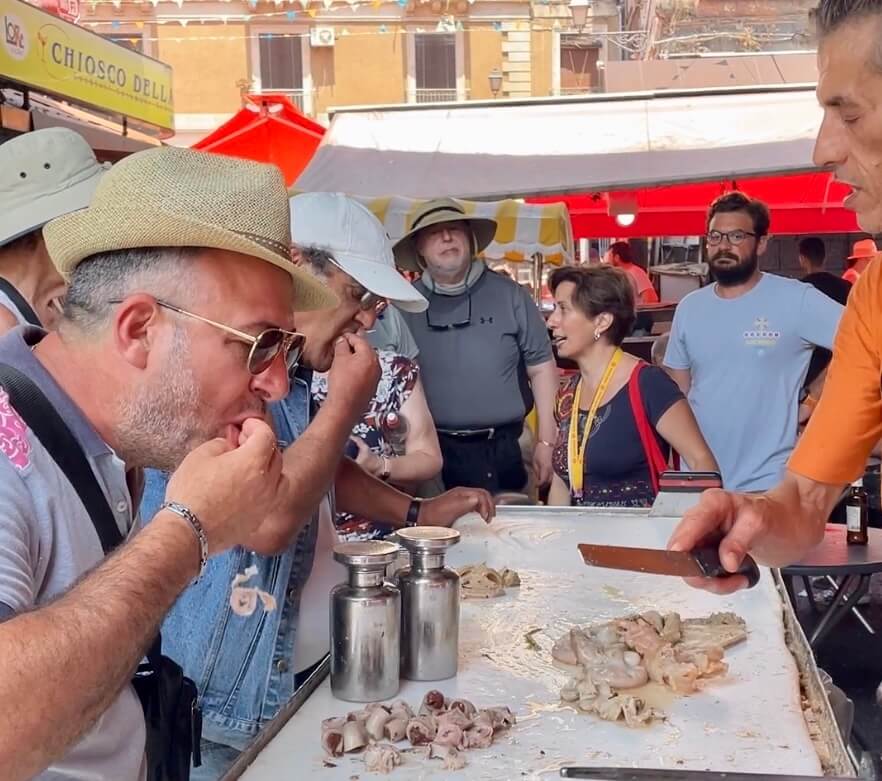
Tourist enjoying offal at a street food stall in Catania, Italy.
My Best Street Food Eating Tips
- Take a Food Tour. I try and visit a market and take a food tour in every destination I visit. It’s a great opportunity to see what the locals eat and get recommendations from someone who lives in the area. I love connecting with the culinary heartbeat of a new place in this way and more often then not have a tour arranged before arrival.
- Eat when the locals eat. Volume will be higher if more people are eating the food. Ingredients will sit out for a shorter period of time.
- Look for long lines. Just like the above advice, higher volume indicates quick turnover.
- Eat where the locals eat. Ask for suggestions. Most residents are honored to give you their opinion.
- If you’re just starting to step out of your comfort zone, take a cooking class. You’ll no doubt learn a lot about the local cuisine.

Potato chip food vendor in Madrid, Spain.
- Fresh cooked foods that are served hot are a good bet. What is in season and grown in the area?
- Don’t eat the skin of fruits, peel it or forget it.
- Be careful of ice and fresh fruit drinks. While i’ll indulge in ice from a hotel or restaurant where I know the water is filtered, elsewhere, I’m not so brave.
- Take advantage of a window into the kitchen. You can see where the dishes are washed-another consideration with the water.
- Bring antibacterial food safe wipes for utensils before eating.
- Sauces sitting in the sun for long periods of time-buyer beware.
Suggestions from an Infectious Disease Expert
The well known author of No Germs Allowed, Dr. Wink Weinberg, has been my go to infectious disease Doc for over 30 years, I thought I’d check in with the good doctor about the latest on safely eating street food. He offers a few insights not normally on the list of common practice precautions:
If you’ve ever been to Philadelphia, I bet you had a warm, salted pretzel. I can remember having warm, roasted chestnuts with my Dad while looking at the Macy’s Christmas store windows. Wherever you go, street food is an integral part of the experience. Although these rites may be somewhat more risky in the developing world, they don’t have to be.
Take Southeast Asia for example. Street food is a quintessential part of the Bangkok experience. Wherever you go in the city, food stalls are plentiful and you will find a high concentration of them in busy areas. Some street vendors operate in groups, especially in local markets, which means you can go to the same place every night and have a different choice of meal. Some food stalls are even open around the clock.
Examples of Street Food in Bangkok
Here’s some of what you might find:
- Som Tam (ส้มตำ) – Papaya salad
- Khao Pad (ข้าวผัด) – Fried Rice
- Pad Thai Kung (ผัดไทยกุ้ง) – Noodles with shrimp
- Khao Mun Gai (ข้าวมันไก่) – Steamed chicken on rice
- Gai/Moo Bing (ไก่/หมูปิ้ง) – Grilled chicken/pork skewers
- Sai Krok Issan (ไส้กรอกอีสาน) – Sour Issan sausage
- Pad krapao moo (ผัดกระเพราหมู) – Stir-fried pork with basil
- Pla Pao (ปลาเผา) – Fish barbecued in salt
If you look over this list, most of the menu is infection-risk-free, but there are a few pitfalls. Uncooked food anywhere — in the U.S., in a restaurant recently in the news, in a market where there is a healthy selection of to go, on a cruise ship, in your own kitchen — is a risk, but this risk is magnified in the developing world.

Street food in Myanmar, one for me, one for you.
Anywhere with lower sanitation standards than the U.S. the incidence of food-borne illness increases. With that in mind, I would advise you leave the Som Tam off of your order.
Possible Infectious Diseases from Street Food
Paragonamiasis
If you choose to take your chances and eat street food that hasn’t been “de-germed” with heat, you will probably be just fine; it is more likely than not that you will get away with it. Your risk of acquiring a food-borne infection will vary by location. Wherever you are, you will have some risk for for E. coli, amebiasis, Salmonella including typhoid, ascaris and other worms and norovirus. In Bangkok, I would also worry a little about paragonamiasis.
Paragonimus is a lung fluke (flatworm) that infects the lungs of humans after eating an infected raw or undercooked crab or crayfish. The most typical lung symptom is coughing up salty-tasting phlegm often mixed with blood. Less frequent, but more serious cases of paragonimiasis occur when the parasite travels to the central nervous system, rarely causing paralysis.
Paragonamiasis occurs mainly in Asia including China, the Philippines, Japan, Vietnam, South Korea, Taiwan, and Thailand, where crab and crayfish are commonly served. Increase your safety chances by making sure it is cooked thru.

Som Tam
Som tam is prepared with finely shredded green papaya, peanuts, cherry tomatoes, green beans, chilies and garlic. It is traditionally made by mixing the papaya with the other ingredients after mashing them together in a crock. The dressing is made with lime juice, fish sauce, tamarind water and shaved palm sugar. Som tam is almost always served with sticky rice. Cooked shrimp or crab meat are often added. Added together many of the ingredients increase risk.
Helicobacter Pylori
Another infection that you may not have considered while traveling is Helicobacter pylori. This bacteria is very common even in the United States. In the U.S. and other industrialized countries about ¼ of people are carrying H. pylori. But the prevalence is 70% in developing countries and many travelers have come home with it from eating uncooked food.
The Nobel Prize was given to Barry Marshall and Robin Warren in 1982 when they showed that H. pylori caused peptic ulcers. Ulcer disease went from very common to rare. But the infection can also cause gastritis, nausea. dyspepsia, stomach pains, bloating, belching, and sometimes vomiting or black stool. It can be treated but is better avoided.

Ants and ant larvae
Now, let’s go to Mexico. Here are the favorite Mexican street foods:
- Tacos al pastor (seasoned, spit-roasted pork )
- Chicharrónes (fried pork belly or fried pork rinds)
- Frutas en tacha (fresh fruits like mamey and papaya)
- Tlacoyos (oval-shaped masa cakes traditionally stuffed with cheese and beans)
- Tlayudas (large, thin, baked tortilla topped with refried beans, Oaxacan cheese and salsa)
- Barbacoa (lamb that has been wrapped in agave leaves and slow-roasted in underground pits)
- Cochinita pibil (slow-roasted suckling pig)
- Pescado a la talla (whole fish that has been butterflied and grilled)
- Esquites (Corn kernels are removed and either boiled or roasted)
- Chinicuiles (fried red caterpillars from the maguey plant)
- Escamoles (ant larvae, also harvested from maguey plants)
- Chapulines (grasshoppers, usually toasted and salted)
So, you should be fine with a long menu of Mexican street food. It’s the toppings you have to be careful about. The above delicacies are often served with guacamole, creamy mayonnaise, spicy (but not sterile) pico de gallo and crunchy slaw.
Cyticercosis
You may get the same viruses, bacteria and parasites already mentioned from those ingredients. In Mexico, you are also putting yourself at risk for cyticercosis.
Cysticercosis is the larval form of the port tapeworm and is the most common cause of seizures in Latin America. You do not get it from eating pork. Rather, you get it by being served by someone who has the tapeworm inside them. Religious Jews in Brooklyn have famously gotten cysticercosis from Latino food handlers.
So, you can eat safely anywhere, or eat unsafely anywhere. Life has its risks and we all have different personal tastes to manage those risks. I’ve offered here a few things to think about that go outside the scope of the most common safety warnings.
Tips from Fellow Travel Writers for Safely Eating Street Food
I thought I’d ask fellow bloggers Daryl and Mindy Hirsch from 2foodtrippers, a couple I’ve seen in action more then once enjoying delicious street food for their tips. Here’s what they had to say:
Eating street food is one of our greatest pleasures when we travel whether we’re in Hanoi, Mexico City, Stockholm or New York City. However, we try to be careful so that we don’t get stomach issues that derail our travel fun. We look for vendors with long lines. Locals know the best food, and that’s what we want to eat too. Next we do a visual check of the stall for good hygiene – things like a clean work station and metal bowls. Then we order and enjoy.

Mindy and Daryl from 2foodtrippers enjoying street food in Hanoi
Pre-Trip Packing and Tips
I always check in with my travel clinic before leaving on my travel adventures. In addition to informing me of any inoculations I might need, they are always helpful for special things to be aware of in a particular destination. I also never travel without purchasing travel insurance
- I take a daily probiotic (year round)
- If you have a specific allergy, I highly recommend getting translation cards indicating specifics for the destination. In some cases they can be life saving
- Ginger tea or ginger chews can help settle the stomach
- Wipes for cutlery
- Imodium
- Oral Rehydration salts (great for summer travel in the heat as well) and activated charcoal
Conclusion
Food for thought. Everyone who travels regularly develops their own routines for staying safe and healthy while eating street food on the road. To a large degree, eating out is like rolling the dice. At some point no matter what country you are in, your number will come up, and that is just the luck of the draw. Precautions can help you avoid getting sick while enjoying one of life’s great pleasures–the flavors and culinary treasures around the world.
I would love for you to share some of your strategies for safely eating street food in the comments below.



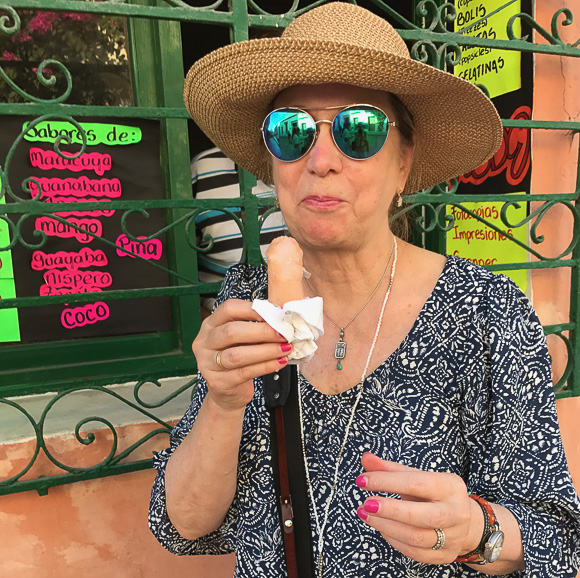
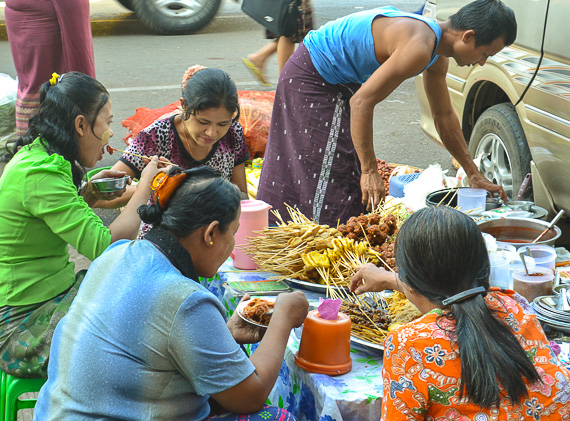
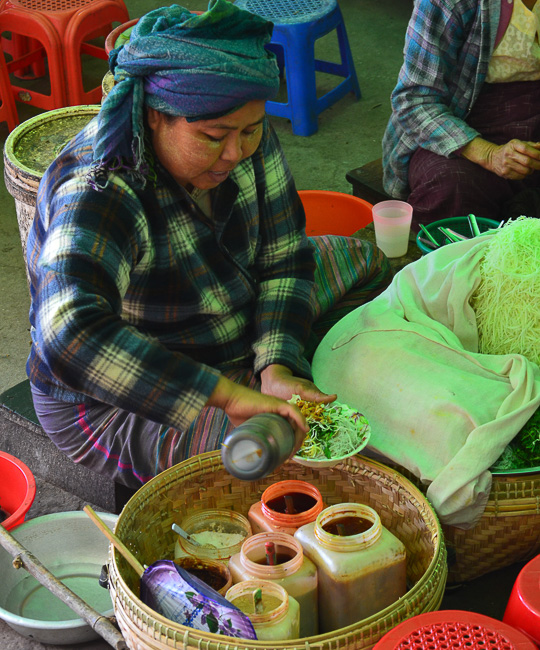

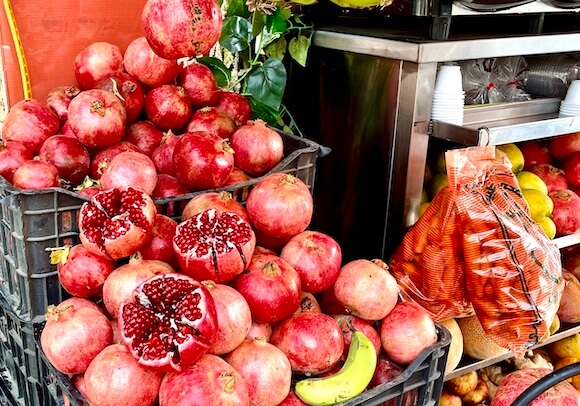


































Really interesting post! The info on the lung fluke (flatworm) is pretty terrifying. I’m a food lover and adventurer who seems to get sick from both street food and restaurant food when I travel. I can eat at the same place as others and they’ll be fine and I end up on an IV. I eventually adopted a few rules which include – no raw food, no chicken (cooked or otherwise), no mixed concoctions plus I take Microdyne to disinfect food to eat in my hotel ( I try to get a room with a kitchenette.) In Mexico I mostly eat beans and rice, some fish and grilled meats. So, far, my strategy is working as I haven’t been sick for almost 3 years.
Thanks for sharing all these thoughts Michele.I’ll have to look into Microdyne, but it seems like you have a system perfected to work for you.
We love street food and it is a huge part of our travel experience. So far so good, we haven’t ever had any real problems. We do look for thoroughly cooked items, and generally steer clear of seafood on the street.
Terrific post Alison! Isn’t it funny but I too had a friend I was traveling with get food poisoning from a bagel and cream cheese at a very large US airport. You just never know. I’ve only been down with it once – it’s not fun at all.
Very interesting post, Alison. I must say I was very surprised about the possibility of getting the tapeworm cercosis from someone who is infected with it versus having to eat the food itself! That is very shocking!
Regarding the eating of street food and getting sick, I’ve been travelling now for 40 years. I used to get sick when I first started travelling, but rarely did any more–even though I eat a lot more crazy things now than I did back then. I think our immune systems seem to strengthen when we test them vs staying in a hypo-allergenic environment and then straying out for the first time.
Think you are right on about our immune systems Doreen. I feel the same way about over sterilizing your hands and living space.A few germs are not necessarily a bad thing.
I’ve eaten street food all over the world and it’s only made me properly ill once. I think that was probably my own fault – I’d seen the state of hygiene in the serving area before I ordered the food!
Great info. I am a big fan of street food myself and just as 2FoodTrippers, I always evaluate the hygiene of the stall I am looking at. I was just in Penang and our driver took us where the best laska was served, however, it didn’t look very clean and I was almost 5 months pregnant. I decided to pass on the “best laksa” and settle for second best at a clean stall!
Great story Jessica that proves the guide books/locals are not always right. My eyes are the best test too. Still I envy how brave you have been on your travels throughout this pregnancy! Super Woman!
I try to avoid street food but usually eat in restaurants but the change of environment always plays havoc to my system.
I hear you Bola. Travel is not the best digester around. I’ve gotten a formula that now works pretty well for me and it includes everything in moderation!